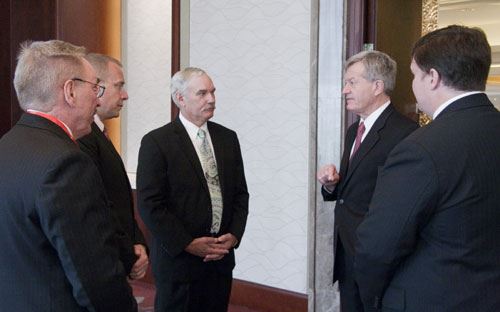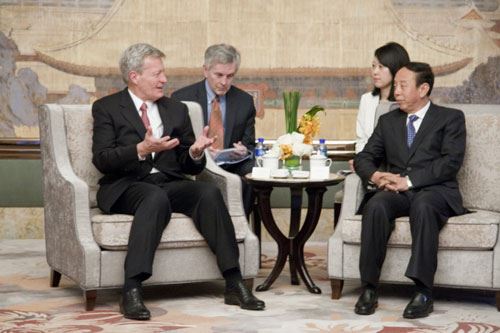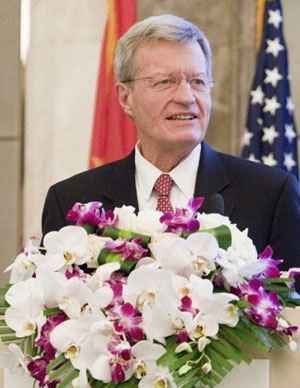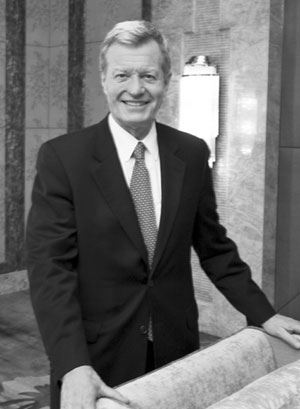|
A Push For US Agriculture
Trade Mission To China Offers Hope For Increased Agriculture Exports
JOHN M. LAROSE &
BETTY VALLE-GEGG NAEGER
MidAmerica Farmer Grower
SHENYANG, CHINA
In an effort to boost agricultural trade with China, U.S. Ambassador to China Max Baucus traveled from the U.S. Embassy in Beijing, China to Shenyang, China on May 7, where he joined the Northeast China U.S. Agribusiness Trade Mission (ATM) led by Michael Scuse, Under Secretary, Farm and Foreign Agriculture Service, USDA, Washington D.C.
This was the first official visit by the Ambassador to the Liaoning Province since his confirmation as Ambassador to China earlier this year. According to the Foreign Ag Service (FAS), one in every four rows of soybeans planted in the United States makes its way to China.
Ralph Bean, Director, Agricultural Trade Office, USDA, Beijing, China answers the question, How big is China? “China’s gross domestic product (GDP) is equivalent to Brazil, Russia, India, Turkey and Taiwan combined.”
U.S. agriculture exported $30 billion into China last year, while the United States imported only $10 billion from China’s agricultural sector into this country.
While in Shenyang the Ambassador; Under Secretary Scuse; Scott Sindelar, Minister-Counselor for Agriculture Affairs, U.S. Embassy, Beijing; Scott Weinhold, Consul General, U.S. Consulate General Shenyang; and Phil Karsting, Administrator, Foreign Agriculture Service, (FAS), USDA Washington D.C. attended a luncheon hosted by Liaoning Province Party Secretary Wang Min, where they discussed U.S./Northeast China trade interests.

Having a chance to visit during the ambassador’s visit
to the Agriculture Trade Show in Shenyang, China from left to right are
Scott Sindelar, Minister-Counselor for Agricultural Affairs US Embassy,
Beijing, China; Phil Karsting, Administrator Foreign Agriculture
Service, Washington, D.C.; Michael Scuse, Under Secretary Farm and
Foreign Agriculture Service, Washington, D.C.; US Ambassador to China,
Max Baucus and Scott Weinhold, Consulate General, US Embassy Shenyang,
China.
Photos by John LaRose
Prior to the dinner banquet, the Ambassador and the other U.S. officials met with the Liaoning Province Vice Governor Zhao Huaming in the VIP room of the Shangri-La Hotel Conference Center. “Typically a meeting in the VIP room before a reception tends to be a courtesy call, just formalities and niceties,” Scott Sindelar said. “Ambassador Baucus took advantage of the opportunity and asked some very detailed, probing questions. Governor Zhao seemed quite willing and eager to respond in detail, so what is typically a shorter meeting took longer than most people expected.”

A typical meeting before the dinner banquet tends to be a courtesy call and for formalities but Ambassador Baucus (left) took advantage of the situation to ask
some very detailed questions of Liaoning Province Vice Governor Zhao Huaming (far right) who eagerly responded in detail. Pictured in the back are interpretures.
Following the visit with Governor Zhao, the entire group attended the USDA hosted dinner reception with the full ATM delegation, which also included eight State Department of Agriculture’s and 28 U.S. companies and commodity organizations. Later both Baucus and Zhao visited with the delegation.
Sindelar added that any time a U.S. ambassador is in a foreign country, he is a strong advocate for American agriculture.
“That’s good for us,” he said. “Ambassador Baucus is proving himself to be that strong advocate, and I know we certainly look forward to continue to work with him.”

US Ambassador to China, Max Baucus
While in Shenyang, Ambassador Baucus sat down for an exclusive one-on-one interview with John LaRose, Publisher of MidAmerica Farm Publications, who was traveling with the ATM.
Baucus, who has roots in agriculture, calls himself just “an ordinary, red blooded Montana kid.”
“Actually my great grandfather came to Montana from Germany in the 1870s and started a ranch with a few head of cattle,” he said. “Over time, he just put together a full operation.”
Born in Helena, Mont., Baucus attended school there and worked at the family ranch which his brother, John, manages today. The ranch began as the Mitchell place, but as other homesteads came up for sale, Baucus’ ancestors bought them out.
“It started out as a sheep ranch, my great-grandfather, Henry Sieben, trailed 10,000 head of sheep from California and about a third of them died on the way,” he explained. Despite that, it was a profitable venture, since he was a “shrewd fellow.”
“That was back in the old days before income tax,” he said. “He didn’t even have a little book; he kept everything in his head. He’s in the National Cowboy Hall Of Fame in Oklahoma. That’s how I grew up, working livestock, fixing fences, haying. I’ve stacked more bales of hay than I can shake a stick at. Got a new set of friends every summer because they didn’t want to stack, they wanted to do something easier. So I had to go back and recruit some others.”
While he loved the ranch, the soil, the animals, and the perspective it gave him driving a tractor or riding a horse, he wanted to see what else was going on in the world. So he went out of state for college and law school, receiving his college and J.D. degrees from Stanford University in California.
Baucus began his political career when he was elected to the Montana House of Representatives for the 1973 to 1974 term. He was elected to the U.S. House of Representatives and served from 1975 to 1978. He served in the U.S. Senate from 1978 to 2013, and was Montana's longest serving U.S. Senator, also serving the third longest tenure among those in the U.S. Senate.
Baucus was chairman and ranking member of the Senate Committee on Finance, vice chairman of the Joint Committee on Taxation, member of the Senate Committee on Agriculture, Nutrition and Forestry, and member of the Joint Select Committee on Deficit Reduction. He was also a member of the Senate Committee on Environment and Public Works and chaired its subcommittee on Transportation and Infrastructure.
He has extensive experience in international trade. As Chairman of the Senate Committee on Finance, Baucus led the passage and enactment of Free Trade Agreements with 11 countries: Australia, Bahrain, Jordan, Chile, Colombia, Morocco, Oman, Panama, Peru, Singapore, and South Korea. He also worked to increase U.S. exports by knocking down trade barriers and led business leaders on trade missions abroad to Germany, Spain, Belgium, Russia, Japan, New Zealand, Brazil, Colombia, and China. During his tenure on the Senate Committee on Finance, Ambassador Baucus was deeply involved in orchestrating congressional approval of permanent normal trade relations with China in 2000 and in facilitating China's entrance into the World Trade Organization in 2001.
Washington claimed a lot of his time, but he still managed to go back to Montana every other weekend and during recesses. As the ambassador to China, he sees little differences between that and the challenges and responsibilities of a U. S. senator.
“One thing is similar; you just go on 24/7 representing people, trying to do what is right for them,” he said. “The job description is a little bit different. One is I have a boss, the President, and I’m working for him now. Back in the Senate I was working for the people of Montana. And right here I’m working for the President and also the people of the United States. This is also more of an executive position. In the Senate, I had a staff of 70 and half of the committee staff and half of personal staff. That included staff not just in DC but in Montana. I had 7 offices in Montana, which has a population of one million people.

“In this job there are about 2,000 people I oversee in five different communities. There are five consulates and the embassy, and there are about 40-some different agencies in the building in addition to the State Department. So I’m helping coordinate all that.
“Being a Senator is pretty easy in the sense that you know what you have to do. You do all the case work and make sure it’s handled perfectly. And Montana is an agricultural state. I was on the Ag committee, so I had to make sure that the farm bill makes sense for Montana, make sure to get beef exported to Asian countries, Japan, Korea and now I work in China. So, this is more difficult, in substance and also execution. I mentioned execution because you have to help coordinate everything.”
As ambassador, Baucus’ goal is to build even stronger economic ties both ways for both the United States and China. Trade, investments and building good relationships with key people based on trust are his focuses.
“I want to help them understand the United States and the U.S. position and help balance the ball so the relationship works,” he said. “My main goal is to do all I can to help the President and our country, to make sure we get this relationship right for the United States and China. I think it all boils down to that.”
Locally, workers in the Farm Service Agency are pleased that Baucus is the ambassador to China. With his background in agriculture, he is viewed as the perfect selection. He plans to be very much involved with the agriculture trade issue.
“We have these great products in our country, they are the best, and I think people around the world like to consume our best,” he said. “But they’ve got parochial issues for business and exporting, so we’re going to help knock down those barriers.”
Baucus finds agriculture trade with China somewhat similar to trade of other products.
“However, we have a long way to go,” he pointed out. “I feel China could be much more open. I helped China become a member of the World Trade Organization (WTO) and I felt back then that it could be mutually beneficial to both China and the United States, that if China were a member of the WTO they would be more likely to play by the rules. Even though we had to give up the ability to bring unilateral actions, I still thought it better to be a part of a world trading system,”
There have been improvements, he admits, but China has a lot further to go.
“In agriculture, there’s the intellectual property rights issue, there’s procurement, it’s dumping, we’ve got a lot of countervailing duty cases against China.” he said.
Baucus could not cite where the greatest potential to increase U.S. exports to China exists, but he feels there’s a huge potential in agricultural products.
“You know, four years ago our total trade was $100 billion. For US/China today, it’s over half a trillion. It just exploded. And it’s pretty much across the board. However, I do think there is a huge potential in agriculture. Why? Because I think China’s demand for foodstuff is going to grow very significantly. They want a lot more meat, and that’s going to be very significant. The greatest percentage of the Chinese consumer’s budget it going to be devoted to food.”
China’s citizens are becoming more concerned about children’s safety, health and the quality of the food.
“China has water pollution; a lot of the soil is contaminated with cadmium, nickel and arsenic for example. That’s not nationwide, but there’s enough of it so that the Chinese consumer is concerned about the quality of Chinese food. Altogether, I think that gives us a great leg up.
“Also, take soybeans, why are soybean exports to China so high? Partly it is oil, but it is feed as well.”
With contaminated soil, the Chinese prefer to feed uncontaminated produce to livestock so they can preserve the quality of the meat.
Baucus feels that with the help of FAS and the FAS sponsored trade show that was underway there is a better chance to increase agricultural exports to China.
“However, China also is very interested in selling to the United States. The food fair here in my impression, is that they want to buy our products too,” he said.
Seafood is one example; it was surprising to see the number of people at the food fair in line for seafood. The wine from the United States also drew attention.
“I think that is significant,” Baucus said. “I was talking to the head of Alibaba Jack Ma last week and he said many Chinese consumers are buying online. Their distribution system isn’t very good. So they go online. And what are they buying? Jack says their folks say it is fresh food, foodstuffs, including seafood. If Jack Ma – he’s no dummy – thinks there’s a big future in foodstuffs and consumer food and seafood, that to me indicates there’s going to be a significant increased demand in China.”
Baucus reported hearing of a food fair in Shanghai where a purchaser on the spot bought out a U.S. dairy company.
“So the seller was going back to the United States to place an order for a lot more cattle, so he could have more dairy products,” he reported. “I just think, it’s been the case with China with all commodities the demand is high. And so it’s foodstuffs, its iron ore, its copper, commodities, the demand is high. The market is becoming so developed, and also people have more money.”
While Baucus has been on trade missions to China for the past 30 years, a lot of the focus has been on agricultural products, but also everything across the board.
“Here at the food fair, for example, one guy showed me, he’s selling peas from Montana.”
The United States is China's largest agricultural trading partner, with total China-United States trade in agriculture reaching $40.4 billion in 2012, up more that 17 percent from the previous year. China remained the largest export market for United States agricultural products and the United States was the second largest export destination for China-origin agriculture commodities.
In 2012, China's agriculture imports from the United States continued an upward trend to reach a record $30 billion, representing an increase of nearly 20 percent on a yearly basis. The import value has more than doubled since 2009. Soybeans, cotton and corn were the top three agricultural commodities imported from the United States.
China's agricultural exports to the United States increased to $10 billion, up nearly 11 percent year-on-year. Plywood, apple juice, and pet food were the top three agricultural exports to the United States.
Ambassador Baucus added that China has 21 percent of the world population and with its expanding middleclass; China offers an enormous market for American agricultural products.
China’s urban household per capita expenditures on food in the last 10 years has increased by 100 percent, while its expanding middle class has increased by over 200 percent in the same period.
All of this combined is creating an enormous environment for the sale of American agricultural products to China. ∆
Watch for more “A Push For US Agriculture” in future issues of MAFG.
JOHN M. LAROSE: Publisher, MidAmerica Farmer Grower
BETTY VALLE GEGG-NAEGER: Senior Staff Writer, MidAmerica Farmer Grower
|
|